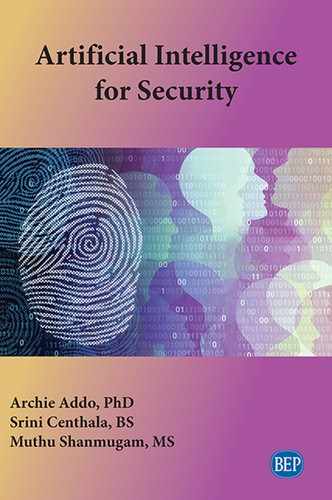Chapter Outline
- Define knowledgebase for the AI project
- Security knowledge development
- Objectives of the security Knowledgebase
- Identification of knowledge for security
- Knowledge acquisition for security
- Knowledge sharing
Key Learning Points
- Learn and understand knowledgebases
- Understand security knowledgebase development
Artificial Intelligence (AI) has intelligence that could be used repeatedly in applications with different needs. Corporate human resources have been tough for organizations (Albeado Inc. (Saratoga, C), 2019). Capturing and using the human intelligence required in organizations would be helpful. Captured knowledge and intelligence can be stored in the knowledgebase to build knowledge models, train the machines, and to use when necessary.
Capturing and using human intelligence requires an integrated information system. The idea is to develop an integrated system that provides the knowledge required by human experts. These integrated systems should be readily available and sharable. The integrated system should be used with strategic objectives in mind. This leads to the development of AI.
AI is used to solve important challenges based on the information stored in the knowledgebase. Human experts have cyclical demands in their subject matter expertise. Similar approaches are applied to management that are explored with use cases.
The knowledgebase stores data, techniques, and algorithms that will be used to drive the AI integrated system. The integrated system will be introduced gradually. The objective of the AI integrated system is to seek mitigation solutions for security in corporate settings. The objectives will consider using business rules that consist of “what if” questions. This uses strategic rules and logic to determine possible mitigation solutions using the stored data in the knowledgebase. The AI integrated system will impact knowledge objectives, identification of knowledge, knowledge acquisition, knowledge development, knowledge sharing, preservation of knowledge, fixing of knowledge, use of knowledge, evaluation of knowledge, and measurement of knowledge. The system will also impact the integration of AI case-based knowledge, representation of security cases, and the identification of similarities. AI connections are the building blocks of the knowledgebase. Bizstats.ai was built from scratch and turned into a full-blown AI integrated system using the knowledgebase.
Security Knowledge Development
The purpose of this section is to generate risk and security knowledge. This includes ideas, models, skills, processes, and methods that the system needs to train and learn. Machine learning (ML) can have various forms. Pattern-based learning is used in ML neural networks. This method gathers knowledge from a large amount of risk and security data, enabling the AI system to adapt when necessary.
Objectives of the Security Knowledgebase
Skills and knowledge must follow the appropriate corporate objectives in the Bizstats.ai security knowledgebase.
The objectives of security knowledgebase are as follows:
- To capture the threat and associated securities from the data, process, people, things (e.g., Internet of things), systems, and actions.
- To determine threat occurrence.
- To determine impact of threats.
- To determine a security threats priority.
- To allocate security owners.
- To determine security mitigation.
- To determine security action.
- To monitor security threat(s) continuously in real time and determine corrective action.
- To recommend security training and efficient security process(s).
Identification of Knowledge for Security
The corporate setting is used to model skills and knowledge to enable the AI to work well. This requires mapping the collected security knowledge. Every effort will be made to store the data in a form that enables the data to be retrieved correctly. This AI system allows access to collected data. Ultimately, the system should be able to build a corporate knowledgebase capable of being extended with new security data. The AI system has the ability to prevent any loss of information, retain, and update the security data. The system is automatically capable of building the knowledgebase and can search for additional information externally.
Knowledge Acquisition for Security
Security data will be collected using formal and informal channels. The data will be used internally and externally. The data collected will enable suitable competencies of the AI system. The data will ultimately come from experts and will be used with statistical, ML algorithms.
Knowledge Sharing
The purpose of security knowledge sharing is a critical part of the knowledge management cycle. It is important to realize that people, technology, and the corporate world are part of this phase. AI knowledge sharing solutions consist of machine intelligence that is capable of learning from other AI systems using real-time API. Discovering trends in a specific area, such as security mitigation, can be effective. Another area where AI has been used efficiently is in the vehicle manufacturing industry. Humans do not need to go through the repetitive nature of using the data; the computer system does the job efficiently without overwhelming. Bizstats.ai has real-time API access to solve knowledge-sharing problems.
